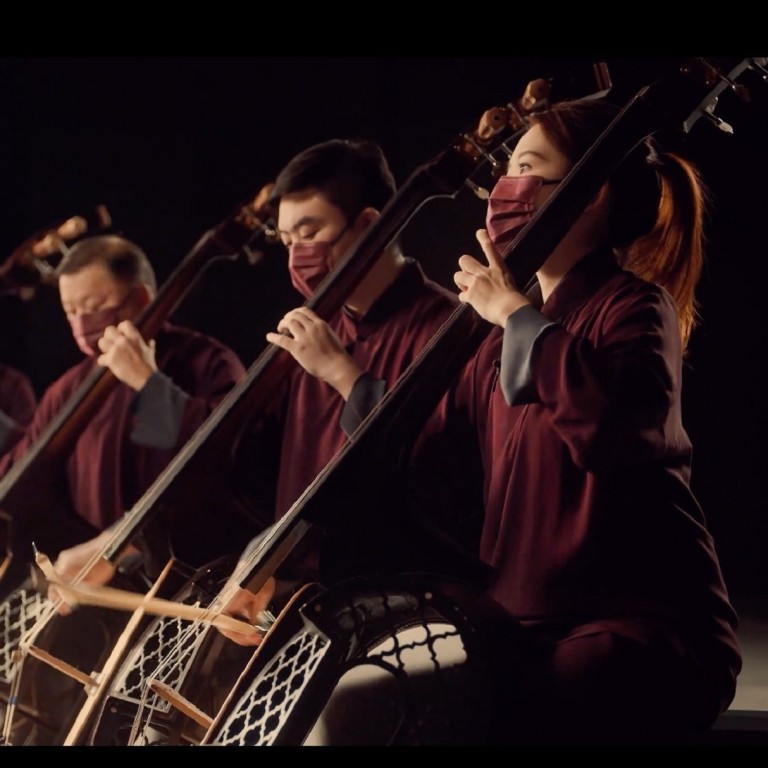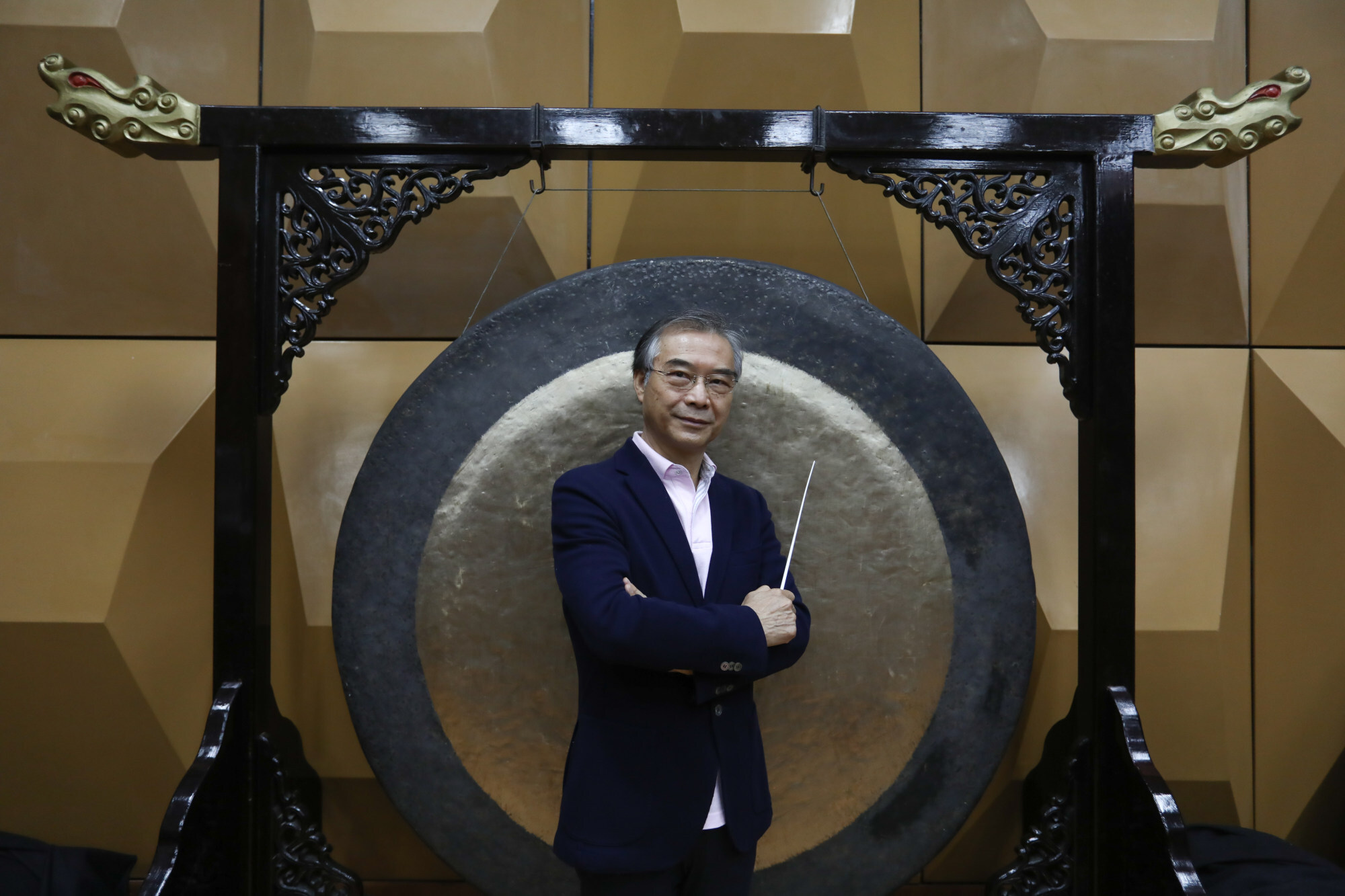
Hong Kong Chinese Orchestra ready to open city’s arts festival with programme of premieres and past commissions
- Artistic director of Hong Kong’s only professional orchestra of Chinese instrument players has used hiatus over past year to mine its archives
- The orchestra will showcase the best of the 2,400 works it has commissioned in past 44 years, along with new ones, in a series of concerts
In normal times, Hong Kong’s only professional Chinese orchestra performs every three or four days on average and embarks on multiple international tours each year.
So the past 12 months have required a major adjustment by the 100-plus members of the Hong Kong Chinese Orchestra (HKCO), as the Covid-19 pandemic led to the cancellation of more than 100 of its concerts in public venues and schools in the city, and to the putting on hold of tours to Europe and China.
The players continued to perform nevertheless. Videos posted on social media have been the orchestra’s main outlet, a way to reach the public when the waves of venue closures put their season on hiatus.
As one of Hong Kong’s biggest publicly funded arts groups, the orchestra was able to hire Mark Cheung Kit-bong, a director who normally works with Canto-pop stars, to make a series of very flashy videos of festive music specially arranged by Ng King-pan, an Australia-educated composer who flits between pop and classical styles.
Dragon Phoenix, the latest video, which was released on social media this month, has been viewed around half a million times on the orchestra’s Facebook page. It is exactly how a Lunar New Year celebration should be – an energetic, jubilant exultation.
Beneath 80 red lanterns, maestro Yan Huichang stands poised in the centre of a whirlwind of leaping lion dancers and 80 musicians playing on instruments such as the orchestra’s own “eco-huqins” (spike fiddles made with synthetic materials instead of python skin) and an eye-catching replica of a 2,500-year-old bianzhong – a set of heavy bronze bells rarely seen played in concerts.

A year ago the orchestra was giving a series of Lunar New Year concerts in Europe when the extent of the global coronavirus pandemic became clear. Celina Chin Man-wah, its executive director since 2001, says the orchestra finished their last concert in Dresden, Germany, on February 5 and just managed to get back to Hong Kong before the city closed its international borders.
“While in Europe, we started making plans for what we would do when the concerts stopped. To encourage the appreciation of Chinese music is our mission, and there is a lot we can do both online and offline,” she says.
Yan, the orchestra’s artistic director and principal conductor for life, has spent much of the past 12 months delving into the archives to identify the best recordings the 44-year-old orchestra has made and to identify a core group of works that can be considered HKCO “classics”.

“We have commissioned 2,400 new works in the past 40 years. That is more than any other orchestra as far as I know, and we want to celebrate that unique relationship we have with composers through the re-release of recordings and also, concerts dedicated to their work,” says Yan.
These concerts are about to begin. Hong Kong venues have reopened just in time for the orchestra to give the opening concert of the 49th Hong Kong Arts Festival on February 27. The programme comprises three commissioned works dating from the 1980s to 2020, and world premieres of two works that play on the orchestra’s role as a bridge between traditional Chinese music and other genres.
The first of the new pieces is Blue Notes by Leon Ko Sai-tseung, a composer for musical theatre and films who has created a hybrid of nanyin, a traditional Cantonese form of singing, and the American genre blues. The second piece is a section taken from Chan Ming-chi’s Tale of the Mahjong Heroes.
Hong Kong Chinese Orchestra puts its faith in youth
It promises to be a riotous portrayal of the rowdy tile game, and will see the percussion principal Luk Kin-bun adopt an instrument rarely seen in a Chinese concert: handpans.
The concert will feature Hong Kong Philharmonic Orchestra principal cellist Richard Bamping as soloist in Zhao Jiping’s Zhuang Zhou’s Dream, a cello concerto written in 2008 for Yo-Yo Ma and the HKCO.
The concert will be performed to a live, ticketed audience at the Hong Kong Cultural Centre, as well as being live-streamed free of charge online. This hybrid model seems destined to stay beyond the pandemic, especially for a group whose core mission is to popularise Chinese traditional music.
Yan, a self-declared tech geek, says an experiment by the orchestra and mobile telephony network provider 3 Hong Kong in June last year in which they live-streamed an outdoor concert using 5G networking was a resounding success. He hopes to see more collaboration between artists and the technology sector in Hong Kong.
“I have always thought that to be important. That’s why, when we conducted a global search 20 years ago for my number two, we chose [as resident conductor] Chew Hee Chiat, a rare talent who went to the US to study for a double degree in cello performance and computer science, and who is just as capable of writing software as a piece of digital music,” he says.
Now aged 67, Yan says that there has naturally been discussion of succession planning with the board in recent years. However, having a title for life precludes the option of full retirement.
“They still want me to lead the orchestra, it seems. For example, we are conducting master classes and publishing a lot of teaching material. I once said that I would never teach before the age of 50. In my current stage of life, it is certainly something that I want to do more of,” he says.
“Music about China”, Hong Kong Chinese Orchestra, 8pm February 27, 2020, Hong Kong Cultural Centre Concert Hall. Tickets available on the Hong Kong Arts Festival website. Free online live streaming is also available.

